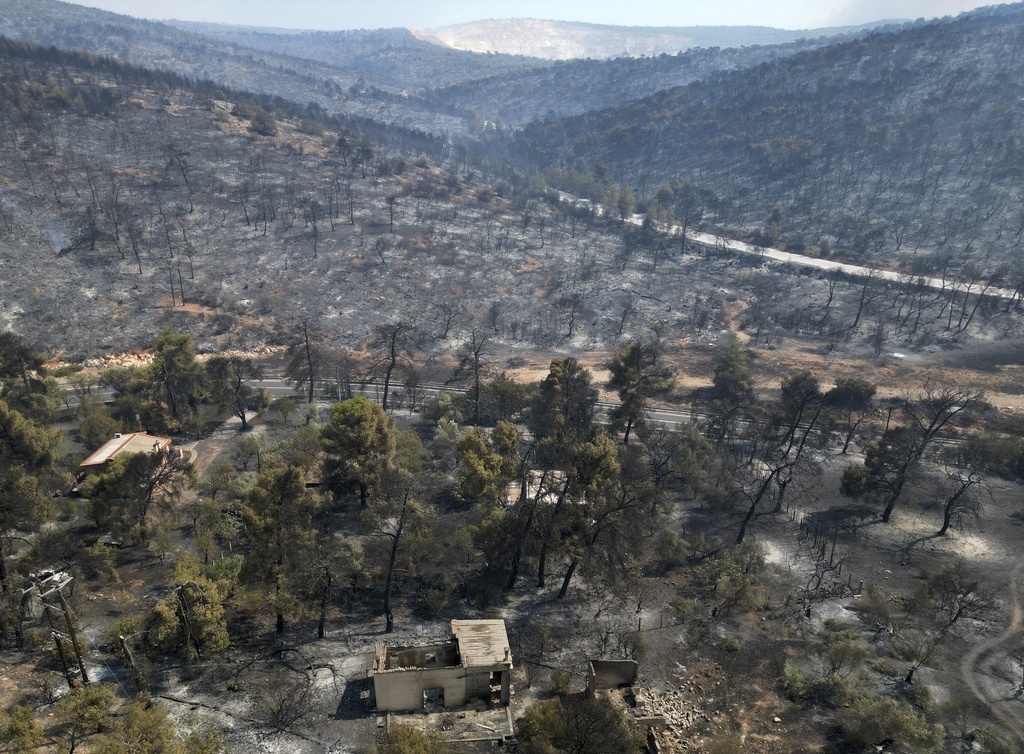It’s high summer in the Northern Hemisphere and while people from Arizona to Beijing shelter from the sweltering heat, a startling new analysis has revealed that this July may be the hottest month yet recorded, with an average temperature of at least 1.5°C higher than pre-industrial levels.
The evidence overwhelmingly points to human activities like burning coal, oil and gas as the culprits behind this unprecedented surge in heat.
 Burnt trees, vegetation and a home after a wildfire near Gennadi village on the Aegean island of Rhodes, southeastern Greece, on Thursday, 27 July 2023. Wildfires raged across parts of the country during three successive Mediterranean heat waves over two weeks, leaving five people dead. (AP Photo / Petros Giannakouris)
Burnt trees, vegetation and a home after a wildfire near Gennadi village on the Aegean island of Rhodes, southeastern Greece, on Thursday, 27 July 2023. Wildfires raged across parts of the country during three successive Mediterranean heat waves over two weeks, leaving five people dead. (AP Photo / Petros Giannakouris)
The analysis by Dr Karsten Haustein, a climate scientist at Leipzig University, released on Thursday, found that the global average near-surface temperature in July will eclipse the previous warmest July by a considerable margin.
Using forecast data, Haustein’s analysis found that July 2023 will be more than 0.2°C (+/- 0.1°C) warmer than July 2019, which holds the current record. According to projections, the average temperature for July is expected to surge 1.3-1.7°C above pre-industrial levels. It is, therefore, all but assured that July will set a global temperature record.
“Based on preliminary data, including forecast temperatures until the end of the month, it is virtually certain that July 2023 is going to be the warmest July by a wide margin with ~0.2°C (+/-0.1°C) above the previous record. Not only will it be the warmest July, but the warmest month ever in terms of absolute global mean temperature. We may have to go back thousands if not tens of thousands of years to find similarly warm conditions on our planet.
“The record comes as El Niño has just been declared in the tropical Pacific. While contributing to the warmth, the fundamental reason why we are seeing such records is the continued release of vast amounts of greenhouse gases by humans. Since the effects of El Niño only fully emerge in the second half of the year, June — and now July — are likely [to be] followed by more record warm months up until at least early 2024,” Haustein said.
Read more in Daily Maverick: UN agency declares El Niño has begun, warns of soaring temperatures, extreme weather events
Haustein continued, “Such dramatic climatic changes also trigger unprecedented marine and continental heatwaves, increasing the risk for record-shattering temperature extremes across the globe. China, Southern Europe and North America all saw record or near-record temperatures these past weeks. So does the North Atlantic Ocean.
“Ironically, this does not exclude rather unsettled conditions in some regions. In fact, northern and parts of western Europe were lucky enough to sit under clouds for much of the month, while most other densely populated regions saw above-average temperatures, just as one would expect on a rapidly warming planet.”
United Nations Secretary-General, Antonio Guterres said of the finding that “short of a mini-Ice Age” in coming days, July 2023 would likely “shatter records across the board”.
“Climate change is here. It is terrifying. And it is just the beginning…children swept away by monsoon rains, families running from the flames (and) workers collapsing in scorching heat.”
Guterres went on to say that “the era of global warming has ended” and “the era of global boiling has arrived.”
The World Meteorological Organisation (WMO) said in a statement that according to ERA5 data from the Copernicus Climate Change Service (C3S), “the first three weeks of July have been the warmest three-week period on record and the month is on track to be the hottest July and the hottest month on record.”
“On July 6, the daily average global mean surface air temperature surpassed the record set in August 2016, making it the hottest day on record, with July 5 and July 7 shortly behind. The first three weeks of July have been the warmest three-week period on record,” the WMO notes. They added that it is extremely likely that July 2023 will be the hottest July and also the hottest month on record, following on from the hottest June on record.
The organisation adds that they predict that there is a “98% likelihood that at least one of the next five years will be the warmest on record” and a “66% chance of temporarily exceeding 1.5°C above the 1850-1900 average for at least one of the five years.”
It is important to note that exceeding the global average temperature increase by going 1.5°C above the 1850-1900 average is not the same as permanently exceeding the 1.5°C level specified in the Paris Agreement which refers to long-term warming over many years.
Earlier this month, an extreme heatwave swept across various regions of the world, bringing unprecedented high temperatures. On 16 July, Death Valley in the US, and northwest China experienced temperatures exceeding 50°C. Meanwhile, in Europe, a record-breaking hottest day was recorded in Catalonia, and several areas in Spain witnessed their highest recorded daily minimum temperatures.
Deadly heat
Tragically, the scorching heat in Mexico led to the loss of more than 200 lives. Other countries, including Spain, Italy, Greece, Cyprus, Algeria and China, also reported fatalities caused by the heat.
Using published peer-reviewed methods, scientists collaborating at the World Weather Attribution initiative assessed to what extent human-induced climate change altered the likelihood and intensity of the extreme July heat in the southwest of the US and Mexico, Southern Europe and China.
They found that:
- “Heatwaves are amongst the deadliest natural hazards, with thousands of people dying from heat-related causes each year. However, the full impact of a heatwave is rarely known until weeks or months afterwards, once death certificates are collected, or scientists can analyse excess deaths.
- In line with what has been expected from past climate projections and IPCC reports, these events are not rare any more today. North America, Europe and China have experienced heatwaves increasingly frequently over the last years as a result of warming caused by human activities, hence the current heatwaves are not rare in today’s climate, with an event like the one currently, expected approximately once every 15 years in the US/Mexico region, once every 10 years in Southern Europe, and once in five years for China.
- Without human-induced climate change, these heat events would, however, have, been extremely rare. In China, it would have been about a one-in-250-year event, while maximum heat like in July 2023 would have been virtually impossible to occur in the US/Mexico region and Southern Europe if humans had not warmed the planet by burning fossil fuels.
- In all the regions, a heatwave of the same likelihood as the one observed today would have been significantly cooler in a world without climate change. Similar to previous studies, we found that the heatwaves defined above are 2.5°C warmer in Southern Europe, 2°C warmer in North America and about 1°C in China in today’s climate than they would have been if it was not for human-induced climate change.
- Unless the world rapidly stops burning fossil fuels, these events will become even more common and the world will experience heatwaves that are even hotter and longer-lasting. A heatwave like the recent ones would occur every 2-5 years in a world that is 2°C warmer than the pre-industrial climate.”
Dr Zachary Labe, a climate scientist at Princeton University who participated in a webinar on the Leipzig University analysis, said, “July is likely the hottest month in our historical records. This is no surprise. We are very much experiencing the reality of decades of predictions from scientists warning that temperatures are rapidly rising due to human-caused climate change.
 People shelter from the sun under an umbrella while a firefighting helicopter operates during a wildfire at a beach near Gennadi village on the Aegean island of Rhodes, southeastern Greece, on Thursday, 27 July 2023. (AP Photo / Petros Giannakouris)
People shelter from the sun under an umbrella while a firefighting helicopter operates during a wildfire at a beach near Gennadi village on the Aegean island of Rhodes, southeastern Greece, on Thursday, 27 July 2023. (AP Photo / Petros Giannakouris)
“The impacts and consequences are being felt by communities and ecosystems around the world, especially for the most vulnerable. Without a reduction in the emission of greenhouse gases, the heat and subsequent risks will unfortunately continue to amplify.”
Carlo Buontempo, Director of the Copernicus Climate Change Service (C3S) at the European Centre for Medium-Range Weather Forecasts said in a statement that “Record-breaking temperatures are part of the trend of drastic increases in global temperatures. Anthropogenic emissions are ultimately the main driver of these rising temperatures”.
In the WMO statement, the organization’s Secretary-General Professor Petteri Taala said “The extreme weather which has affected many millions of people in July is unfortunately the harsh reality of climate change and a foretaste of the future.”
Read more in Daily Maverick: Weather experts issue alert over looming El Niño as sea surface temperatures hit record highs
Dr Zeke Hausfather, a research scientist at Berkeley Earth, added: “Global surface temperatures have been exceptionally warm for the first three weeks of July, hovering around 1.5°C above pre-industrial levels. This is driven by a combination of rapid global warming due to human emissions of CO2 and other greenhouse gases and by a strong El Niño event developing in the tropical Pacific.
“Years with El Niño events tend to be warmer than other years, but the inexorable march of temperatures upwards due to climate change is adding a permanent El Niño worth of heat to the Earth’s atmosphere every five to 10 years. July — like June before it — will almost certainly blow away the prior record for the month by a huge margin.”
Hausfather added: “The exceptionally warm temperatures we’ve seen so far in July make it increasingly likely that 2023 will be the warmest year since records began in the mid-1800s. Our past emissions of CO2 have accumulated in the atmosphere, and even without any additional warming, this century will be warmer than any similar period in the past 120,000 years.
“The effects of the El Niño event developing this year will be felt even more strongly on global surface temperatures in 2024, so if the world sets a new record in 2023 it’s likely it will be quickly surpassed. The only way to stop the Earth from continuing to warm and extreme events associated with climate change from becoming more severe is to get global emissions of CO2 down to net zero.” DM
To read all about Daily Maverick’s recent The Gathering: Earth Edition, click here.
https://www.youtube.com/watch?v=REeWvTRUpMk




 People shelter under an umbrella while a firefighting helicopter operates during a wildfire at a beach near Gennadi village on the Aegean island of Rhodes, southeastern Greece, on Thursday, 27 July 2023. (AP Photo / Petros Giannakouris)
People shelter under an umbrella while a firefighting helicopter operates during a wildfire at a beach near Gennadi village on the Aegean island of Rhodes, southeastern Greece, on Thursday, 27 July 2023. (AP Photo / Petros Giannakouris) 